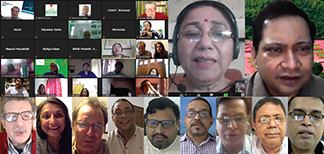Dhaka, 10th October 2020. Today BDCSOProcess a forum of 700 local NGO/CSO have their 3rd day and concluding session title “UN in 75: Interfacing Government and Civil Society for Development and Sustainable Peace” have a call reaffirming to support UN for multilateralism at the international level and should give more focus on promoting human rights and sustainable peace. But at the national level, they urge the UN not to replace rather reinforce local CSO/NGOs with equal partnership and transparency so that it is the local NGO/CSO that will lead the humanitarian response and development. Especially including in the Rohingya response UN should limit their role only to monitoring and technical assistance.
The concluding session was chaired by Ms. Shaheen Anam, Executive Director, Manusher Jonno Foundation (MJF), Chief Guest was Mr. Nazrul Islam, Director General, Ministry of Foreign Affairs; and Mr. Rezaul Karim Chowdhury, National Coordinator, BDCSO moderated the session. Special Guest was Mr. Roberto Bissio, Social Watch, Uruguay; expert speakers were, Ms. Smruti Patel, A4EP, Switzerland; Mr. Keonraad Van Brabant, GMI, Switzerland; Dr. Dipankar Datta, Oxfam International; Mr. Kazi Faisal Bin Seraj, The Asia Foundation; Md. Rafiqul Islam, FNB; Mr. Arifur Rahman, YPSA; Mr. Mohsin Ali, WAVE Foundation; Mr. Abu Murshed Chowdhury, Cox’s Bazar Chamber of Commerce, PHALS & CCNF; Mr. Fayezullah Chowdhury, BUP; Ms. Momotaz Khatun, Ashroy Foundation; and Mr. Rafiqul Islam Khokan of RUPANTAR. A lot of grass-root leaders have also spoken.
Ms. Shaheen Anam said that at the international level we will fight for the UN to uphold multilateralism, but at the national level, the UN should not consider that we are in another part, local NGOs have to be treated with equality. She expressed full solidarity and respect to the human dignity of Rohingyas, but Local Ngo’s leadership should not be undermined. Mr. Nazrul Islam said that UN CSO and Multilateralism should have synergy, the government recognizes the leadership role of local NGOs in grass root.
Mr. Roberto Bissio has explained in what funding dynamics the UN has to work, that only 2 % fund has to go to human rights, the UN has only flexibility in 20 % fund, while donors earmark 80 %. The rich country downplays the UN and peace effort, while they pay per person $273 for militarization, but they only pay per person only $ 7 for the UN. While the budget for the New York police budget is $5.2 billion, compared to this UN core budget is around $ 3.07 billion. In the past UN Resident Coordinator has to report to UNDP now it is to UN Assistant Secretary-General. As UN money is taxpayers’ money, then the UN has to ensure full transparency and accountability to the national government and local people, where they are working.
Ms. Smruti Patel said that local NGO voices should be heard at the UN top-level, UN has to show accountability to local actors for aid money. Mr. Keonraad Van Brabant said that, regarding peacebuilding and campaign against gender and all other violence, Rohingya leaders have to be brought in the forefront. Dr. Dipankar Datta said that, rather than talking about UN reform, there should be a discussion on what their commitment is and how much they have fulfilled that. Mr. Kazi Faisal Bin Seraj said, Bangladeshi NGOs are in so matured that they should not be undermined, it is not 1971. Mr. Abu Murshed Chowdhury expressed hope that UN agencies should not further delay to declare and implementation of the localization road map, the present crisis of violence in Rohingya camps cannot be minimized without the participation of local NGOs and local govt. Press Release [Bangla] [English]
Newslink
 |
|
 |
 |
 |
 |
 |
 |
 |
 |
 |
 |

